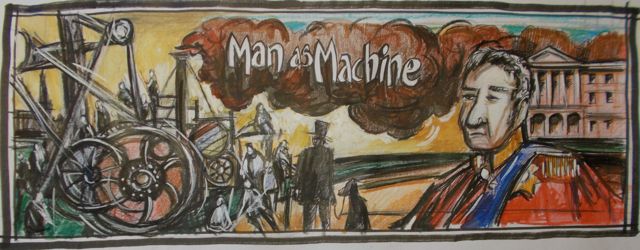After too long a break Tarquin O’Flaherty continues his discussion of George Stephenson, Trains and the industrial revolution and their impact on the politics of the day. (You can find the previous 15 pieces by searching ‘Trains’ in the ‘Search’ box, right.)
At the grand opening of the Liverpool to Manchester railway line, eight trains were employed. The most important and newest of these, the Northumbrian was driven by George Stephenson himself and carried dukes, earls and important personages by the dozen. Amongst these rather grand dozens were the Prime Minister, (the Duke of Wellington), the Austrian ambassador, Prince Esterhazy, Earl Grey, Sir Robert Peel, Lord Melbourne and William Huskisson, one time President of the Board of Trade and now Mayor of Liverpool.
Two railway lines had been built, an out and return, but for the grand opening,both lines would carry trains to Manchester. The Northumbrian, with the Prime Minister on board, used one line exclusively. At a good vantage point along the line, this newest engine would stop to allow the Iron Duke a magnificent view of the other seven trains as they steamed past on the other line.
At first this plan worked extremely well. The Phoenix, driven by Stephenson’s son Robert, followed by the North Star with George’s brother Robert at the controls, sailed by without a hitch. The next train due, the Rocket, was delayed. Against all advice Esterhazy and Huskisson decided to stretch their legs. When the Rocket appeared it took both men by surprise. Esterhazy managed to jump to safety straight into the Duke’s carriage. Huskisson, much less agile, with a semi-paralysed leg and considerably overweight, tripped and fell. Unable to stop, The Rocket passed over the man’s thighs. Two doctors were immediately available to apply tourniquets to Huskisson’s terrible wounds. When they had done all they could, George Stephenson, using a single carriage towed by the Northumbrian, took the wounded man to Eccles, outside Manchester. Despite the best available medical attention, Huskisson died that same evening.
Following much fierce argument, it was decided to carry the trains on to Manchester. This was in retrospect, a very wise decision indeed. Unaware of the tragedy, a delay of several hours had created almost mob rule amongst the expectant thousands at their destination. Had they not arrived, the police, reinforced by the army, were of the opinion that the mob would have unleashed their frustrations on the whole of Manchester. As it was, as Prime Minister, the Duke of Wellington suffered the twin indignities of having hoi-polloi almost completely block the line and scream abuse at him through his carriage window, whilst a hail of missiles rained down on his roof.
The glory of Waterloo was long gone. In its place was the common people’s hatred of a right-wing, monarchist Prime Minister who seemed unaware of the momentous changes the Industrial Revolution was bringing to the country. Wellington was a hugely unpopular leader and would very soon be replaced by a new government in constant fear of a local version of the French Revolution.

